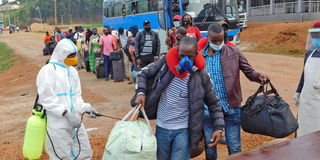Govt should prioritise citizens stuck in region

The first batch of 100 Ugandans who had been stuck in Rwanda since the outbreak of Covid-19, cross into Uganda at Katuna border post on Tuesday. PHOTO | ROBERT MUHEREZA
What you need to know:
The issue: Returnees
Our view: Our regional linkages and common bonds must be seen to be working to our utmost benefit. This will give hope of better collaboration in matters of crisis and other important issues which we have sought to conclude among member states in the region.
It was a welcome sight on Tuesday as Ugandans previously stuck in Rwanda crossed into the country at Katuna after months of being locked out on the other side of the border. The group of 100 Ugandans is the first batch of nationals arriving from Rwanda since borders were closed.
At least two other groups of the same number are expected back in the country in the coming days. It was a little surprising though, to find that Ugandans have been stuck in a country so close to home, and yet others in distant countries who were even required to catch chartered flights arrived here many weeks earlier.
There may be many other dynamics involved, of which we do not have the full details, but it seems odd that the people within the East African Community (EAC) would not receive priority when it came to repatriation.
Perhaps the risk of them carrying coronavirus was higher, or maybe there was another valid and important reason. This, however, begs the question: Do we still have Ugandans stuck in other neighbouring countries? If we do, is there a way of knowing where they are and how many they are?
The movement of these people may all be part of the internal processes in the Foreign Affairs ministry.
As we wait for the reopening of borders and the airspace to all, have we accounted for all Ugandans who were unable to travel home when the Covid-19 lockdown came into force?
Many families and lives have been disrupted as a result of the long periods of separation.
The efforts of the Ministry of Foreign Affairs in repatriating nationals is highly appreciated, and the Uganda Media Centre has from time to time shared updates on Ugandans returning after long periods away.
However, it would be reassuring to know that our regional partnerships have been exploited to the greatest extent possible to give help to our countrymen and women in a timely manner. Our regional linkages and common bonds must be seen to be working to our utmost benefit.
This will give hope of better collaboration in matters of crisis and other important issues, which we have sought to conclude among member states in the region. It has been a difficult season all around and many tough decisions had to be made.
We would like to be sure that Ugandans travelling and residing in the region have benefited in the best and most timely way available in our diplomatic toolbox.


